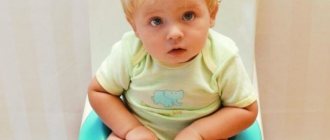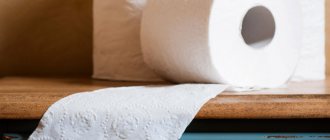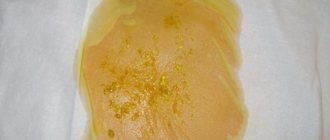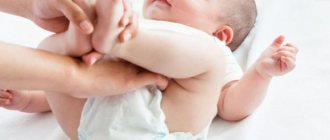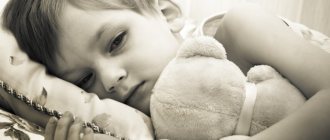Any changes in the health of a newborn cause great concern among caring parents. Especially when it comes to the condition of the stool - any changes indicate problems with the baby’s digestive system. But many mothers and fathers mistake normal stool for diarrhea, since infant stool most often has a liquid consistency. Should you always be wary and what are the signs that distinguish childhood diarrhea?
What should a baby's stool look like?
During the first 3-4 days after birth, the baby’s digestive system secretes a special substance called meconium, which has a rich green color and a thick, viscous consistency.
Normally, feces in breastfed newborns in appearance resemble a mushy, uniform substance, light brown or yellow in color. You can also notice small inclusions of a curd-like type in the stool; they are absent in children fed formula milk.
It is quite difficult to detect diarrhea in an infant under 6-12 months of age. As you know, diarrhea is a frequent bowel movement. But a baby can defecate very often:
- the first month of life - the baby has stool after each feeding, 8-10 times a day;
- the second month of life - the baby has bowel movements not so often, 5-6 times a day;
- third to sixth month - 2-3 times a day, at the same time, the child’s feces acquire a darker color and denser consistency.
The stool of a newborn on artificial nutrition has a dense consistency and a more pungent odor. In appearance, feces resemble the feces of an adult.
Food intolerance
If there is a deficiency of enzymes, a child under one year of age cannot quickly adapt to any introduction of new complementary foods, the digestive function of the body is impaired, and the absorption of beneficial elements by the walls of the stomach is impaired.
Malabsorption (enzyme deficiency) is a congenital pathology, occurs in three types:
- lactose intolerance, poor digestion of dairy products by the stomach;
- celiac disease, damage to the intestinal walls by gluten, cereal intolerance;
- cystic fibrosis, a dangerous, incurable disease, expressed in the disruption of the functioning of chlorine ions; during the disease, the secretions of all body systems thicken.
Lactose intolerance is most common in infants; in order to alleviate the condition of a breastfed baby, the mother should exclude dairy products from her diet.
Gluten intolerance requires the refusal of cereal products in the complementary feeding of a child of one year - semolina porridge, soy, any products made from wheat flour.
Cystic fibrosis requires constant medical monitoring, so regular diets will not play a role here.
Before you do anything, you need to conduct a medical examination, take tests, only then will the real cause of diarrhea be revealed.
Symptoms
A characteristic symptom of diarrhea in infants is increased frequency and thin stool consistency. Other signs of diarrhea in children can differ significantly depending on whether the baby is breastfed or bottle-fed.
The main symptoms of stool disorder in a baby who is fed mother's milk:
- The feces have a consistency reminiscent of kefir or cottage cheese.
- The stool becomes frequent and loose.
- There may be mucus or blood in the stool.
- The stool looks like water.
- The color of the stool may become greenish.
In case of diarrhea, feces acquire a sharp, unpleasant odor, reminiscent of sour milk. As a rule, even inexperienced mothers notice an increase in bowel movements in the baby.
The stool of a bottle-fed newborn has a denser and thicker substance, and also has a light or dark brown tint. External signs of diarrhea in infants can be seen with the naked eye - feces become more frequent and liquid, acquire a specific sour smell, and the number of bowel movements increases to 5-6 per day.
If the baby is already receiving complementary foods, small pieces of food can be seen in the stool. Older children may complain of painful abdominal cramps and become restless and moody.
When the first signs of an intestinal disorder appear, you should definitely consult a doctor, since the consequences of this condition can be very negative for the child’s body.
The main danger of diarrhea is that with frequent bowel movements, the body loses a huge amount of liquid, salts and other useful substances that are vital for the full development of the body. This is why this problem often leads to dehydration, which requires immediate action from parents.
What does a newborn's stool look like?
During the first days, meconium comes out of the intestines of a small child - original feces: the remains of particles of skin, amniotic fluid, hair digested in the womb... This substance looks very unpleasant: viscous, black-green or black.
However, this is an absolute norm and there is no need to worry about it. Usually meconium comes out in the first day or two.
If meconium still continues to pass on the third day, it is better to inform the doctor about this, as this may be a symptom of intestinal atresia - abnormal development of one or more sections of the intestine, resulting in obstruction.
But the child’s stool has returned to normal, but what does the mother see? Mushy, even liquid, yellowish stools.
Is this diarrhea in a newborn while breastfeeding? No, this is a completely normal chair. After all, a child at this age eats liquid food; his intestines simply do not have anything from which to form feces familiar to an adult.
Since the baby feeds on milk, and the immature digestive system does not always fully cope with its responsibilities, there may be small cheesy inclusions in the stool, as well as small clots of transparent mucus. This is also a variant of the norm.
The smell of feces is of no small importance. In children in the first months of life, they have a sour milky smell.
Another indicator is the frequency of bowel movements. During breastfeeding, a baby may poop after each feeding and even sometimes during the feeding. This is absolutely normal and is associated with two factors: firstly, the newborn’s intestines have not yet fully formed, and secondly, the sucking process itself is slightly relaxing.
If the mother does not have enough breast milk, and she is forced to supplement the baby with an artificial formula, a change in stool is inevitable. Firstly, the color of the stool becomes darker, and brownish or greenish inclusions may appear. This is due to the fact that iron is often added to the mixture, this helps to avoid anemia in infants. Secondly, the smell of feces will be unpleasant, although not offensive. Thirdly, bottle-fed babies poop somewhat less frequently.
When breastfeeding, complementary foods are introduced at 6 months. During this period, the nature of bowel movements changes again. Despite the fact that the child eats mostly porridge and pureed vegetables and fruits, such as banana, this is closer to solid food; feces gradually, as complementary foods increase, thicken and acquire a browner tint. The frequency also decreases.
Causes
The causes of diarrhea in a baby can be very diverse - from errors in the nutrition of a nursing mother to improper introduction of complementary foods. Most often, intestinal upset can be caused by the following factors:
- in the first days of a baby’s life, diarrhea often accompanies the digestive tract becoming accustomed to breast milk;
- introduction of complementary foods into the baby’s diet;
- errors in the menu of a nursing mother;
- for bottle-fed babies - replacing the usual formula with another type of food;
- treatment of the mother or newborns with certain medications;
- food allergies;
- teething;
- various intestinal infections;
- the presence of worms in the child’s body.
In the first day of life, the baby’s body actively gets used to breast milk; at this time, its digestive system is populated with new lactobacilli, which may be accompanied by the appearance of loose stools of a greenish or yellow hue.
The introduction of complementary foods or a new food product into the diet of a nursing mother can also be accompanied by intestinal upset in the baby. In this case, “acquaintance” with the new product is carried out gradually - while the mother must closely monitor the reaction of the child’s body. If the baby’s well-being has worsened, it is necessary to wait a while with the introduction of a new dish.
The use of certain medications, most often antibiotics, often causes the development of dysbiosis and disorders in the digestive system. When treating with antibacterial medications, additional medications must be taken to normalize healthy intestinal microflora.
For many babies, the cause of diarrhea can be teething - or rather, the habit of putting toys and other objects into the mouth, on the surface of which there may be various pathogenic bacteria and microorganisms. This provokes stool upset in children.
Signs of dehydration
One of the main and most dangerous consequences of childhood diarrhea is dehydration. It is extremely important to prevent dehydration, since a baby's body contains much more water than an adult's. It is for this reason that the consequences of dehydration for children can be the most dangerous.
The main signs of childhood dehydration:
- Increased viscosity and stringiness of saliva.
- Increased thirst.
- The baby refuses to eat.
- Lethargy, apathy.
- Constant sleepiness.
- A small amount of tear fluid released during crying.
- Difficulty urinating; the urine produced becomes dark in color.
In infancy, a child cannot tell his parents that he is thirsty. But if the baby constantly licks his lips or reaches for water, this indicates the development of dehydration in the child’s body.
If diarrhea in a newborn is accompanied by vomiting or fever, in no case should you self-medicate, you should immediately call an ambulance.
How to treat diarrhea in children less than a year old
Diarrhea is a signal of a problem!
Diarrhea is a method that the body uses to protect itself from the negative effects of external manifestations. Therefore, there is no need to treat diarrhea itself; the cause of this condition should be identified and eliminated. But first, you need to protect your baby from the dangerous consequences of diarrhea. We are talking about dehydration, expressed in the loss of salts and fluids. This condition leads to serious disruptions in the functioning of internal organs.
Firstly, everything must be done to replenish the loss of fluid and salt. Parents are required to do this before receiving specialist advice. Secondly, it is necessary to carry out a set of measures that the doctor will prescribe. It is better not to self-medicate, because a child’s body can unexpectedly react to even the most familiar remedy.
From this video you will learn what the risks are and how to treat diarrhea in a child:
Diarrhea, or diarrhea, is a rather unpleasant phenomenon, characterized by increased frequency and thinning of stools. Diarrhea can be especially dangerous for newborn babies. Diarrhea is difficult to diagnose in infants, since the stool has not yet formed. Parents may not immediately understand that the baby's bowel movements are abnormal. The color, structure, and smell of stool will indicate your health status.
How to Avoid Dehydration
In order to avoid dehydration of the child's body, it is recommended to give the child plenty of electrolyte drinks before the doctor arrives. Medicinal solutions Smecta, Regidron, Oralit are suitable for this purpose. Activated carbon, Enterosgel, Imodium can also be used. The dosage of the drug is selected by the pediatrician on an individual basis.
One-year-old children can be given folk remedies with a pronounced bonding effect - soft-boiled eggs, a decoction of rice cereal, fruit or vegetable purees. For diarrhea in breastfed babies, it is recommended to increase the number of breastfeedings. Mother's milk contains components necessary for the full functioning of the child's digestive system.
Artificial babies should choose an adapted milk formula with a low lactose content. The most common are Nan, Nestozhen, Humana.
Review of remedies for diarrhea in newborns
For diarrhea, doctors prescribe drug therapy for young children under one year of age to eliminate and relieve the symptoms of the pathological condition. With diarrhea, the risk of developing dehydration is high. The main task of parents is to provide plenty of fluids that restore fluid loss during frequent bowel movements. If the disease is caused by intestinal bacteria, antibiotics are recommended. To cleanse toxins and allergens, sorbents are prescribed. With the help of biological products, microflora is normalized. You can improve digestion with enzymes. For non-infectious diseases, medications are recommended that reduce the peristalsis of the infant’s stomach.
Sorbents
Drugs that have a sorbing effect are prescribed immediately. The action is aimed at cleansing the intestines of toxins and waste leaving the body through the excretory system. These drugs are not absorbed into the blood and work locally. It is recommended that infants take medicine for diarrhea separately, not in combination with other medications. The interval between doses is two hours. Often prescribed:
- Smecta. To prepare the solution, mix one sachet of powder and 50 ml of water. Give in small doses throughout the day.
- Enterosgel – for infants from one month of age, 1 tsp, 3 r/w.
- Polysorb. 1 tsp of powder is mixed in 50 ml of water and taken up to 4 times a day, half an hour before meals.
- Polyphepan – stir in a small amount of liquid, based on the dosage – 1 g/kg of the baby’s weight. Use the resulting mixture in four doses throughout the day.
- Filtrum STI - just dissolve half the tablet in water. Take up to 4 times a day.
- Activated carbon is available in the form of capsules and powder. The dose per 1 kg of a child’s weight for diarrhea is 1.5 g. Dilute in water, give up to 4 times a day.
The sorbents have a pleasant taste; there should be no problems with intake. If there is no desire to swallow the medicine, mix with breast milk or the patient's favorite drink. If you develop an allergy to medications, it is recommended to stop taking activated charcoal for diarrhea.
Rehydration preparations
Rehydration products allow you to restore the water-salt balance in the body after diarrhea in an infant. Solutions and milk are used in treatment. If the condition worsens, vomiting occurs, therapy continues intravenously. To normalize intestinal function, the following are prescribed:
- Regidron is a powder containing a complex of salts. Method of preparation: dilute 1 sachet per 1 liter of water. Give the resulting mixture to the baby throughout the day. You can mix the liquid with milk or decoction.
- Glucosan is a preparation containing glucose, sodium bicarbonate and chloride. Available in the form of powder and tablets. Dosage 15 mg/kg of child's weight. Dissolve the composition in 1 liter of water and feed your baby throughout the day.
- Hydrovit – contains dextrose, potassium salt, sodium. Dosage – 15 ml/kg body weight. Dilute the required amount of medicine in 200 ml of water and give throughout the day.
Saline solution, rheopolyglucin, glucose, and Trisol are administered intravenously. An IV for diarrhea in an infant is placed only in a hospital setting under the supervision of a doctor.
Other
To normalize the intestinal microflora and increase immunity from the negative effects of antibiotics and pathogenic bacteria, it is recommended to give biological products containing fermented milk prebiotics. The group of safe drugs for diarrhea in infants includes:
- Bifidumbacterin - contains bifidobacteria that restore the functioning of the gastrointestinal tract. Available in powder form. To prepare, dilute a third of the bottle with warm water, divide the resulting solution into 2 doses.
- Linex in capsules containing lactobacilli. Open the capsule, mix the product with any liquid, give the baby 3 times a day.
The duration of taking biological products is prescribed by the doctor.
Diarrhea causes disturbances in the synthesis and secretion of enzymes. To improve health and normalize the digestive system, infants are prescribed enzymes that promote a speedy recovery.
It is not recommended to use folk recipes at home; only specialists should treat children in their first year of life.
As the condition improves, the number of urges decreases, the feces become hard, and the child begins to recover. After completely getting rid of diarrhea, it is recommended to focus on strengthening the immune system, after consulting with a doctor.
Treatment of diarrhea in infants
Treatment of diarrhea in newborns is accompanied by nutritional correction for both mother and baby. It is necessary to remove from the diet all foods that can cause intestinal upset - fatty foods, milk. If the baby is bottle-fed, he may need to replace the adapted milk formula.
Mothers are advised to introduce new foods into their diet gradually, carefully observing the reaction of the baby's body. This will help eliminate such common problems as stool upset or constipation in the baby.
In some cases, the normalization of the digestive system is carried out with the help of medications selected by a pediatrician. Such medications include Nifuroxazide, Furazolidone.
The independent use of any medications is completely excluded; only a pediatrician can prescribe medications for diarrhea after a preliminary examination of the baby.
If a nursing mother or child is being treated with antibacterial drugs, it is necessary to additionally take medications to normalize the intestinal microflora - Bifidumbacterin, Lactobacterin, Enterofuril. Such products effectively increase the number of beneficial lactobacilli and normalize the functioning of the children's digestive system.
Parents should not be afraid of the child’s body’s reaction to antibiotics; the development of dysbacteriosis is considered normal. It is enough to simply give the child sorbents to increase the activity of beneficial bacteria in the intestinal cavity and drink plenty of fluids in order to prevent problems with bowel movements.
When to see a doctor
If, in addition to diarrhea, the baby is bothered by attacks of vomiting, inclusions of blood or mucus in the stool, an increase in body temperature, or a sharp deterioration in general well-being, this is an alarming sign that requires immediate consultation with a doctor.
These symptoms often indicate the development of a cold or infectious disease in a child. In such cases, only a specialist should treat the baby.
Diarrhea in an infant is a common problem that many parents face. Drinking plenty of fluids, enterosorbents and timely medical care will help mothers and fathers get rid of anxiety for their child, as well as normalize the functioning of the children's digestive system.
Previous entry Anti-diarrhea tablets: cheap and effective!
Next entry Regidron: instructions for diarrhea.
What can diarrhea in a baby indicate?
Diarrhea may be accompanied by moodiness
We must learn to distinguish normal stool from any pathological changes. A timely reaction of parents to changes can save the health and even the life of the child. After all, failures can be evidence of serious illnesses. And simply diarrhea, which is a consequence of a disease, for example, a common acute respiratory viral infection, can quickly lead to dehydration.
What should you pay attention to?
If your baby has loose stools accompanied by vomiting, you should immediately call an ambulance. The following are cases when you should not delay calling an ambulance in case of diarrhea in a newborn:
- the child is not a year old, much less 6 months old, and has developed diarrhea (more than 3–5 cases);
- temperature above 38° C;
- the baby vomited more than 3 times;
- the child has signs of dehydration: sunken fontanel, no tears when crying, dry lips, sunken eye sockets.
You should contact your local doctor if you have the following signs of disturbances:
- mucus, foam in stool;
- a lot of gases coming out during defecation;
- diarrhea occurs often, because of this the baby is weak and does not gain weight;
- streaks of blood are noticeable in the stool;
- a rash appeared in the abdomen, on the cheeks, on the elbows and legs; the rashes have a rough surface;
- diarrhea developed after taking acetylsalicylic acid with an increase in temperature due to ARVI,
- even if several days have passed;
- diarrhea began after treatment with antibiotics for other diseases.
